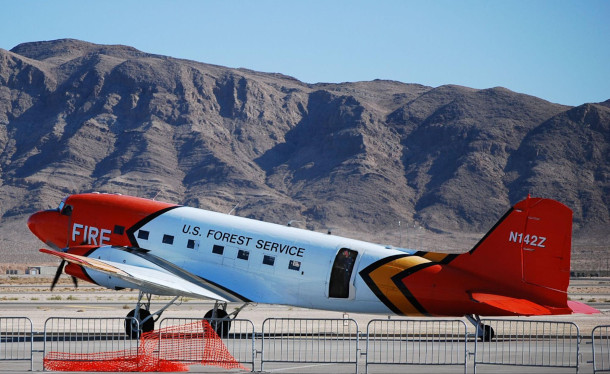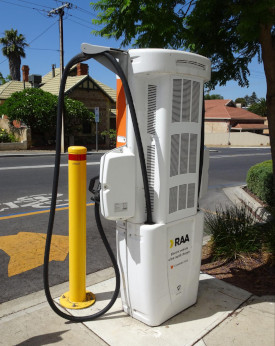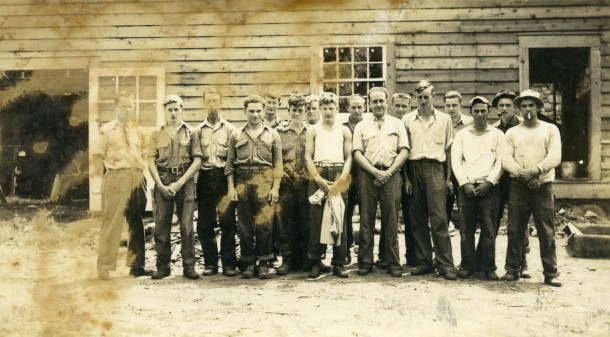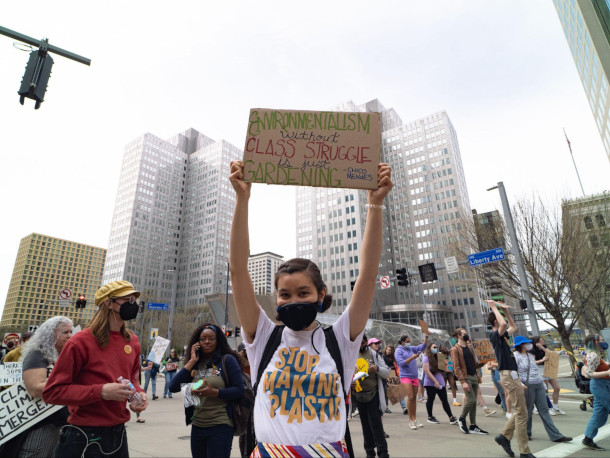The American Climate Corps
Air Date: Week of September 29, 2023

The future clean energy economy will require a technically skilled workforce. (Photo: Trin Trahn, Pexels, CC)
Ninety years after the creation of the Civilian Conservation Corps, the Biden administration is mobilizing a national workforce to tackle today’s crisis of climate disruption. The American Climate Corps aims to train 20,000 young people in its first year for jobs in clean energy, climate resilience, and land restoration. Trevor Dolan of Evergreen Action joins Host Aynsley O’Neill to discuss.
Transcript
DOERING: From PRX and the Jennifer and Ted Stanley Studios at the University of Massachusetts, Boston this is Living on Earth. I’m Jenni Doering.
O’NEILL: And I’m Aynsley O’Neill. In the throes of the Great Depression, US President Franklin Delano Roosevelt established the Civilian Conservation Corps to put more than 3 million men to work. At state and national parks across the country these mostly young men paved roads, cut trails, and constructed lodges, some of which still stand today. These days you can drive along the Blue Ridge Parkway in North Carolina and Virginia, stay in campgrounds at Acadia National Park in Maine, and hike the Bright Angel Trail in Grand Canyon National Park, all thanks to Civilian Conservation Corps labor. Now, ninety years later, the Biden administration is mobilizing a national workforce to tackle today’s crisis of climate disruption. The American Climate Corps aims to hire twenty thousand young people in its first year for jobs in clean energy, climate resilience, and land restoration. The popular AmeriCorps program will organize the Climate Corps, alongside multiple federal agencies including the Departments of Labor, Energy, Interior, and Agriculture. Trevor Dolan has advocated for a national climate corps with Evergreen Action and he joins me now. Trevor, welcome to Living on Earth!
DOLAN: Thanks, Aynsley, glad to be here.
O'NEILL: What kind of jobs are we talking about here? Paint a picture for me about the world where we have the American Climate Corps. What are people up to? What are they tackling on the ground?
DOLAN: For example, we know that wildfires are burning increasingly out of control as a result of the climate crisis. There are steps that folks can take that the US Forest Service can take, for example, to mitigate wildfires by going in, conducting forestry, removing wildfire fuel from federal lands, and we can have American Climate Corps members who are the ones on the ground with the chainsaws, in the work boots, doing the work of preventing out of control wildfires in the future. I'm from New York City originally. In my parents' neighborhood, there were public EV chargers installed recently, chargers for electric vehicles. Climate Corps members, in partnership with the local electrical workers union, could go out and get trained to install electric vehicle chargers. And then on a New York City block they could be out there and Climate Corps shirts, work gloves on, installing electric vehicle chargers. The same could go for federal funding for retrofitting low income households. Federal dollars are available for folks in low income households to install smart thermostats, beef up their insulation, install solar panels, all these things that can reduce energy costs for people in low income housing, that Climate Corps members can be the ones out there, getting their hands dirty, doing the work that is piecemeal tackling the climate crisis, building resilience.
O'NEILL: Yeah, it sounds like it's a pretty wide swath of career possibilities that they might be going down. And it sounds like they'd be setting them up for future career paths.

American Climate Corps members could be trained to perform on-the-ground wildfire mitigation tasks. (Photo: Tomas del Coro, Flickr, CC BY-SA 2.0)
DOLAN: Absolutely. And I'm really glad you raised that. One of the most exciting parts of this program to me is that the White House is very dedicated to making the American Climate Corps a pathway to a good job in the future. The Biden administration has done a lot of work engaging with labor unions on this, and they are hoping to present Corps members with opportunities for apprenticeships and pre-apprenticeships, basically providing them with the hands on training and credentials that they need to then go out and get jobs in the clean energy economy. Folks installing solar panels or installing smart thermometers in people's homes, you have to learn wiring to do that, right? You have to learn how to handle certain tools. And if the Corps, for example, has partnered with the local IBEW chapter, the International Brotherhood of Electrical Workers, they can build a relationship where they say, you know, three Corps members a year who graduate from our program are going to go on to become IBEW members, apprentices to become journeyman electrical workers. So there are a lot of exciting possibilities here.
O'NEILL: This sounds perfect, especially because the whole target is the youth movement. But what about the people who aren't in the projected age bracket? Is there a way that older folks could get involved?
DOLAN: That is one of the exciting things about the Climate Corps. So we expect that it'll primarily be targeted at young folks who are entering the workforce. That is typically AmeriCorps' target demographic. But we are also hoping to see the Biden administration make jobs available for people who are mid career and looking to transition. And this is especially important because a big part of the Clean Energy Transition is that folks are moving from legacy jobs in the fossil fuel industry, to ideally new good paying union jobs in the clean energy industry. And the American Climate Corps is a really exciting opportunity for them, because it doesn't require going back to school, they don't have a college degree, they don't have to, you know, take out tens of thousands of dollars in student loan debt, they can get paid a good wage to train on the job for a new job as an electrician or a carpenter or any number of roles in the clean energy economy.
O'NEILL: Unfortunately, the climate crisis is so often polarized in our current political climate. To what extent is this program supported across party lines?
DOLAN: Obviously, anything that has climate involved in it is going to be somewhat politically polarized. But what we can say with great confidence is that national service broadly, this idea of the federal government paying folks to do work in their communities, is historically very bipartisan. You know, AmeriCorps funding is not generally a partisan issue. Republicans and Democrats alike really like the idea of the federal government paying people to do good work for their communities. And that's exactly what the Climate Corps is.
O'NEILL: I feel like there's been this narrative that's been presented, a false dichotomy of, oh, you have to choose either the environment or you have to choose good jobs. It feels like this has given us both.

Hands-on jobs like installing EV chargers could prepare participants for future careers. (Photo: Michael Coglan, Flickr, CC BY-SA 2.0)
DOLAN: It absolutely is. And it's really highlighting the generational opportunity that we have with the climate investments coming down through the Inflation Reduction Act. The federal government is investing hundreds of billions of dollars in the clean energy transition, creating millions of jobs over the next decade. There's absolutely no reason those jobs can't be high quality, they can't pay a good wage, provide benefits help families live and thrive.
O'NEILL: This program was really inspired by President Franklin Delano Roosevelt's Civilian Conservation Corps, which was created in the 1930s? What will the ACC, the American Climate Corps be drawing on from that program? And what might it do differently?
DOLAN: You know, it really was inspired by the original Civilian Conservation Corps from the New Deal era. And it really ties in more broadly to the Green New Deal platform, this vision of a return to the ambitious governance, the FDR presidency, where the federal government is a visible presence in communities doing good work. What it will take away from the Civilian Conservation Corps is the original CCC came in at a time of national crisis, you know, we were in the deepest depths of the Great Depression. And FDR created a national jobs program to put people to work, building our national parks, planting trees, paying them enough that they could send money home to their family. The American Climate Corps is coming in at a very similar time in American history. We're staring down years of the climate crisis mounting in intensity. And the American climate Corps is coming in at a moment where we really do need to be marshaling the resources of the federal government and of the American people who want to do this work. And we have seen very much so that young folks in America are excited to tackle the climate crisis. They have grown up in a world where they have felt the heat waves, they have had their homes flooded by hurricanes, they have had to flee wildfires, and they want to do something. And the American Climate Corps providing them with that opportunity. Now as to what we're going to do differently, it's really important to acknowledge whenever we're making comparisons to the original CCC, that it was an almost exclusively white male program, you know, it was incredibly exclusionary towards women and people of color. And President Biden has made it clear that he's committed to doing things differently with the American Climate Corps. As part of the announcement of the ACC, he emphasized that it is going to put a priority on working in disadvantaged communities and hiring people from those places. President Biden has already made a justice 40 commitment to direct 40% of the benefits of climate investments to disadvantaged communities. And the White House emphasized that the justice 40 commitment applies to the American Climate Corps. So the President is really putting in the intentional effort to make sure that this is a much more equitable program that's accessible to everyone, that is investing in every community in America.

Former President Franklin D Roosevelt’s Depression-era Civilian Conservation Corps did inspire parts of the ACC. However, the Biden administration says the new program will prioritize hiring members from disadvantaged communities. (Photo: Richard, Flickr, CC BY 2.0)
O'NEILL: How might we get the word out about this movement, especially to the disadvantaged communities that are sort of supposed to be at the forefront of this?
DOLAN: I think there are a few answers to that question. The first is, we just need to make sure that we're directing folks to the sign up for the American Climate Corps. Right now, the White House has made a website available, whitehouse.gov/climatecorps, which allows folks to sign up for more news when slots become available. So there are no positions open yet. But they're expecting to start deploying people around summer, fall 2024. So we should certainly start to see things open up sometime soon. For making sure that folks in disadvantaged communities are aware of this, that is a really important question. And I think one that the White House needs to grapple with. But one of the interesting pieces of the American Climate Corps is that there are well over 150, I think, close to 200 different core organizations and communities around the country, organizations that are already taking people, hiring them, putting them to work on community projects, many of them are already doing climate related work. And a lot of them operate in disadvantaged communities. So the American Climate Corp is taking advantage of a network of core organizations, trusted partners in communities that have not had great experiences with federal government and investment and intervention. And really using those relationships to directly invest in these places.
O'NEILL: Now Trevor, I want to get a bit personal and ask why you are yourself so passionate about the ACC? If this had been around at the right time, would you have been interested in a program like this yourself?
DOLAN: Absolutely. You know, I've been working on the Climate Corps for about three years now. I started when I was 26, I think still well within the range of young folks who would want to join the Climate Corps. My work on this partly came from a really personal passion for climate action. I mean, I work for a climate advocacy organization. But in order to get here, I had to go to college, I got a master's degree for the job that I'm in right now. And I realize that those opportunities are not accessible to everyone. And for the most part, one would hope that most of the jobs created in the clean energy economy are not folks working at think tanks. We actually do need electricians and carpenters and folks installing solar panels and mitigating wildfires. And this partly came from a place of my own deep enthusiasm for climate action, and recognizing that other young people around the country are really hungry for opportunities to do something. The Sunrise movement highlights this more directly than anything else. They were the foremost public champions for the Climate Corps during the reconciliation bill negotiations during the era of the Inflation Reduction Act moving through Congress. Sunrise movement mobilized thousands of young people across the country to march and rally for the creation of a Climate Corps. And seeing that level of energy and enthusiasm from young people is one of the reasons I'm so excited about it, because I know that there is an audience out here, and I know that these 20,000 slots are going to be well over subscribed.

The Sunrise Movement, a youth-led political action organization, has supported the creation of an American Climate Corps. (Photo: Mark Dixon, Flickr, CC BY 2.0)
O'NEILL: Trevor Dolan is a policy lead at Evergreen Action. Trevor, thank you so much for joining us today.
DOLAN: Thanks so much for having me, Aynsley.
O'NEILL: And to find out more about the American Climate Corps, check out the links on the Living on Earth website, loe.org.
Links
Living on Earth wants to hear from you!
Living on Earth
62 Calef Highway, Suite 212
Lee, NH 03861
Telephone: 617-287-4121
E-mail: comments@loe.org
Newsletter [Click here]
Donate to Living on Earth!
Living on Earth is an independent media program and relies entirely on contributions from listeners and institutions supporting public service. Please donate now to preserve an independent environmental voice.
NewsletterLiving on Earth offers a weekly delivery of the show's rundown to your mailbox. Sign up for our newsletter today!
 Sailors For The Sea: Be the change you want to sea.
Sailors For The Sea: Be the change you want to sea.
 The Grantham Foundation for the Protection of the Environment: Committed to protecting and improving the health of the global environment.
The Grantham Foundation for the Protection of the Environment: Committed to protecting and improving the health of the global environment.
 Contribute to Living on Earth and receive, as our gift to you, an archival print of one of Mark Seth Lender's extraordinary wildlife photographs. Follow the link to see Mark's current collection of photographs.
Contribute to Living on Earth and receive, as our gift to you, an archival print of one of Mark Seth Lender's extraordinary wildlife photographs. Follow the link to see Mark's current collection of photographs.
 Buy a signed copy of Mark Seth Lender's book Smeagull the Seagull & support Living on Earth
Buy a signed copy of Mark Seth Lender's book Smeagull the Seagull & support Living on Earth

